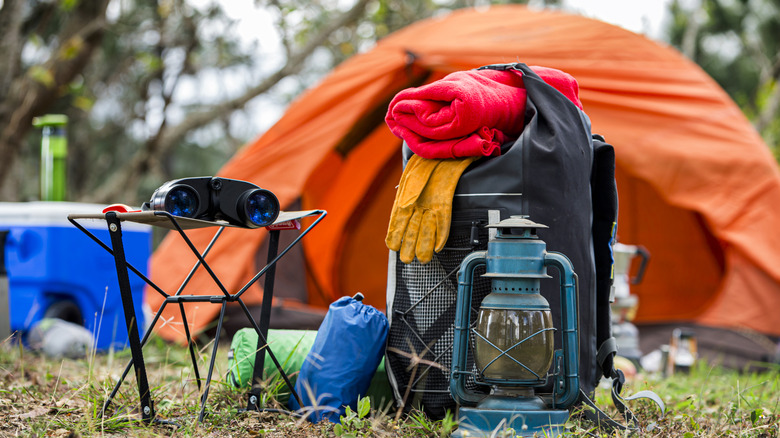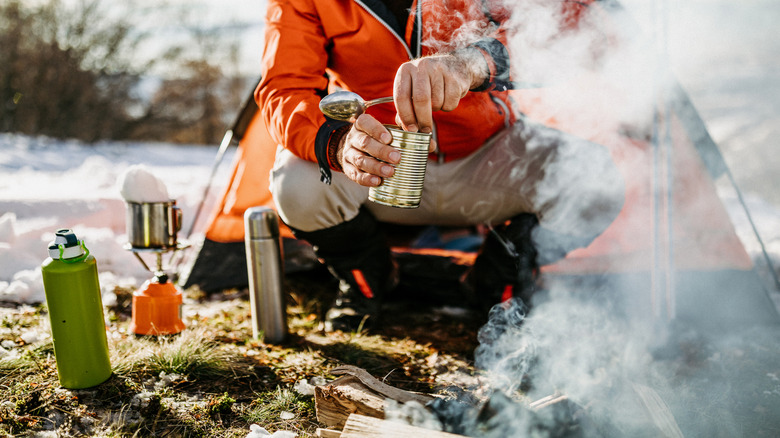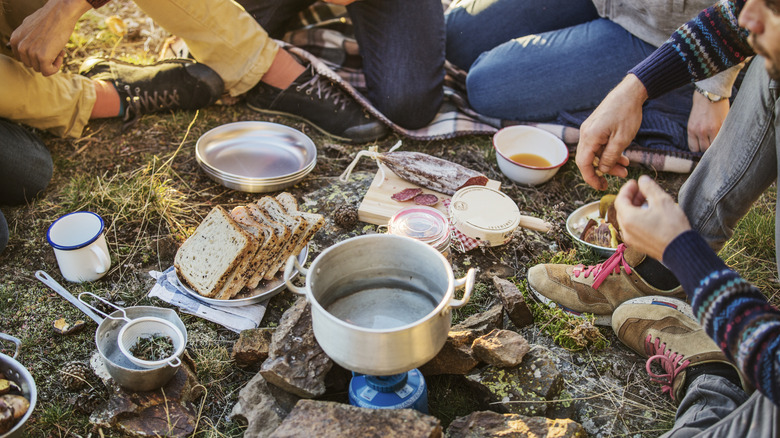Avoid This Dangerous Campsite Cooking Mistake When Preparing Canned Foods
We may receive a commission on purchases made from links.
Camping has become a favorite way to spend time outdoors. People camp in wilderness areas, national forests, and especially national parks. For many, the draw is simple, as Redditor u/asleepinthealpine says, "The beauty of nature, feeling primal and free." That feeling of leaving behind routines, sitting under an open sky, and living simply is exactly why camping keeps winning over millions of people.
When you are deep in the wilderness, whether spending a night in Yosemite or a few days in awe-inspiring remote parks like Gates of the Arctic, food becomes a central part of the experience. Since you can't carry your whole kitchen with you, you need meals that are light, easy to pack, and won't spoil quickly. That's where canned food comes in. The concept dates back to the early 19th century, when Nicolas Appert, a French inventor, developed a way to preserve food for the armies fighting in the Napoleonic Wars. That simple invention still makes it possible for campers today to enjoy dependable meals far from home.
But this is also where a dangerous camping mistake creeps in. After hours of exploring, nothing feels better than sitting down to a warm meal. Exhausted and hungry, a camper might look for the quickest shortcut and toss an unopened can straight into the fire. The truth is, this can be dangerous, as it can cause an explosion that puts your safety, other campers, and the campsite itself at risk. As such, avoiding it altogether might be the best way to go.
Why cooking canned food over a fire is dangerous
Cooking a sealed can of food over a fire is an explosion waiting to happen. A sealed can doesn't have room for its contents to expand under the heat, so pressure builds until it bursts. Campers have shared stories about how close they came to serious accidents when they tried it. On Quora, Mike Oheron recalled the time his brother tossed an unopened can of pork and beans into the flames. The can exploded, and it was sheer luck that no one was nearby to be injured.
On the r/survival Reddit, u/ExiledPlumber compared heating a sealed can to handling live explosives, saying, "It is a terrible idea to heat anything in a sealed can because if it heats up enough it might explode and then be as dangerous as a hand grenade." One Scout recounted tossing a sealed can of Spam into a campfire without opening it, which exploded and startled everyone nearby, making them think they were under attack. The blast's noise and chaos can alarm nearby campers or rangers, drawing unwanted attention and making you the target of avoidable warnings or criticism.
The danger doesn't stop at the explosion. When a can blows up, it sends food and metal flying, creating a mess that can attract wildlife, like bears. The flying food and metal, which would of course be hot already, may also scald you or other nearby campers if it falls on any part of the body. What starts as a shortcut to a hot meal can unexpectedly become a dangerous and costly mistake.
Safer ways to cook canned food at camp
While cooking unsealed canned food directly over a fire is dangerous, fortunately, there are ways around it. One of the easiest methods is to bring a small backpacking pot, like this one from Toaks, which adds almost no weight to your pack. By pouring the contents of the can into the pot, you can safely heat your food over a fire. Another option is to pack aluminum foil and pour the canned food into it for cooking: It's a versatile kitchen staple that makes cooking camping meals easier and more fun, as it can be shaped into a pan or laid over hot coals as a grill.
If for any reason, you still have to cook directly in the can, some campers on Reddit suggest poking holes in the top of the can to release pressure. In fact, health experts also recommend this hole-punching method. Alternatively, you could remove the lid entirely or use a loose cover in its place. It's also advisable to hold the can about 5 inches above the fire and let it heat only for a short period of time, just long enough to warm up the contents.
On a general note, always check park fire rules before lighting a flame, follow Leave No Trace principles before leaving to keep campsites clean, and learn how to be respectful when sharing a campsite. With some planning, you can enjoy your camping without issues. And if you're already thinking about your next trip, this top ranked U.S. state camping destination is a great place to start.


